In 1981, a trio of French scientists coined the term “French Paradox” to describe their finding that, despite smoking like chimneys and eating lots of fatty cheeses and meats and drinking copious amounts of red wine, French men had about half the risk of cardiovascular disease as their British or American counterparts.
One of the theories proposed to explain this anomaly is that there is something in red wine that protects the heart and promotes longevity. And it didn’t take long for lab scientists to identify a particular compound found in grape skin that might be responsible for the French Paradox: resveratrol.
In the years since, scientific and public interest in resveratrol has surged. Longevity entrepreneurs like David Sinclair and Bryan Johnson include supplemental resveratrol in their daily pill stack (and have created companies to sell it). At one point, red wine was seen as an elixir of health, as demonstrated by a 1995 paper suggesting that as many as 3–5 glasses a day could lead to a 49% decrease in mortality.
Before you get too excited, this research has been mostly debunked. It turns out you’d need to drink around 75 liters of red wine a day to consume the amount of resveratrol found to impact health in test tube studies of geriatric yeasts positively.
What’s more, the French Paradox itself turned out to be an illusion; much of the data was flawed and underreported. The French weren’t eating greasy cheeseburgers or oily fish and chips. Instead, they adhered to a largely Mediterranean diet, prepared most of their fresh meals at home, and engaged in more walking and exercise than British or American men. Plus, French doctors didn’t always list heart disease as the cause of death, either because of the way they diagnosed illnesses or simply due to local habits in filling out death certificates.
But all this initial excitement did lead to important research on resveratrol and the family of compounds to which it belongs, the polyphenols. Since then, thousands of studies have explored their biological effects, ranging from antioxidant and anti-inflammatory actions to potential roles in metabolic and brain health, and even its possible anti-cancer effects.
Let’s dive in and explore what resveratrol is, its effects in the body, how to obtain it from food, and whether you should consider supplementation.
What Is Resveratrol?
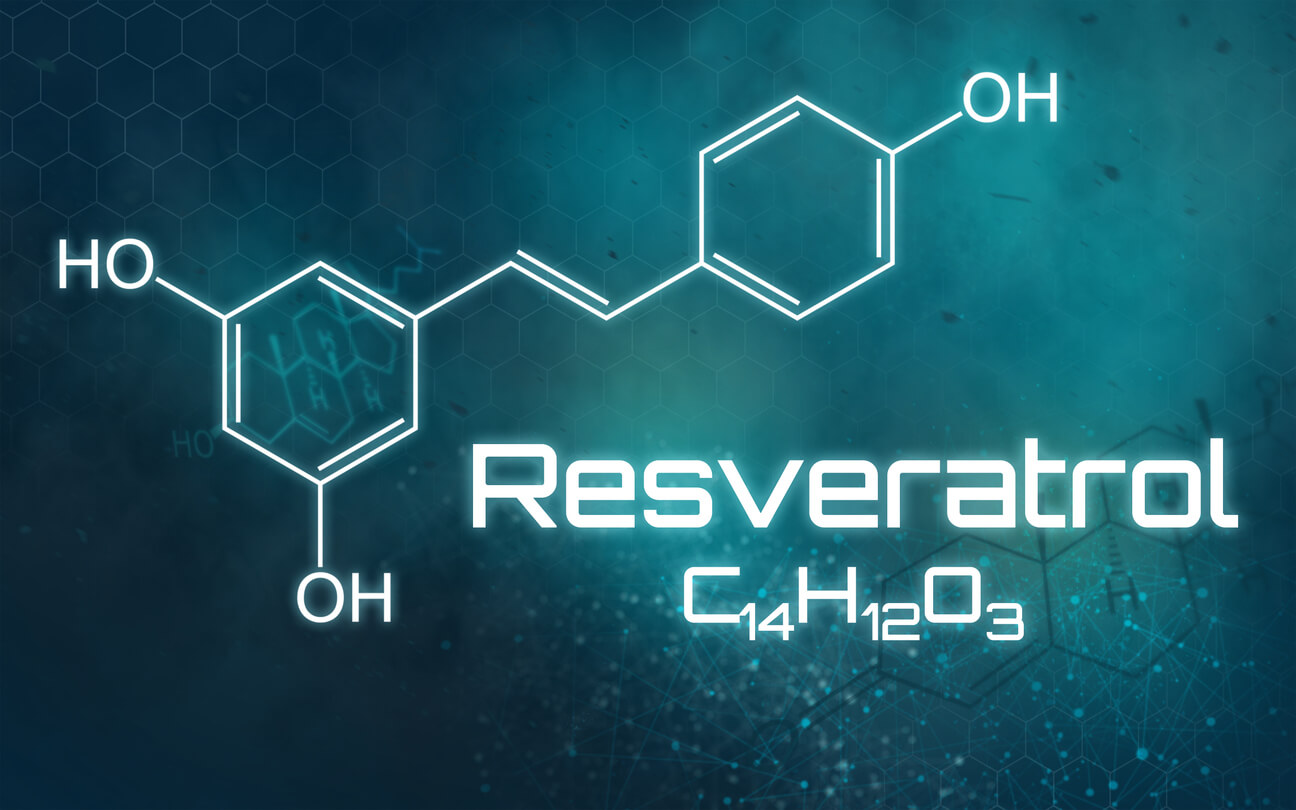
Resveratrol is a member of the aforementioned polyphenol family, which includes more than 800 compounds that lend vibrant colors to the plants that contain them. Other polyphenols include ECGC (found in green tea), anthocyanins (present in red and purple fruits), and flavanols (found in mint and olives).
Resveratrol is in the stilbenoid branch of the polyphenol clan. Plants synthesize stilbenoids in response to stress, injury, or fungal infection.
Resveratrol has been identified in over 70 plant species. You can find it in the skin of red grapes and peanuts, as well as in lower concentrations in blueberries and mulberries. The two food sources that provide the most resveratrol are red wine and a traditional Chinese tea, itadori, that’s derived from the roots of the Japanese knotweed. In Traditional Chinese Medicine, this tea is prescribed as a remedy for colds, flu, and digestive issues.
Health Benefits of Resveratrol
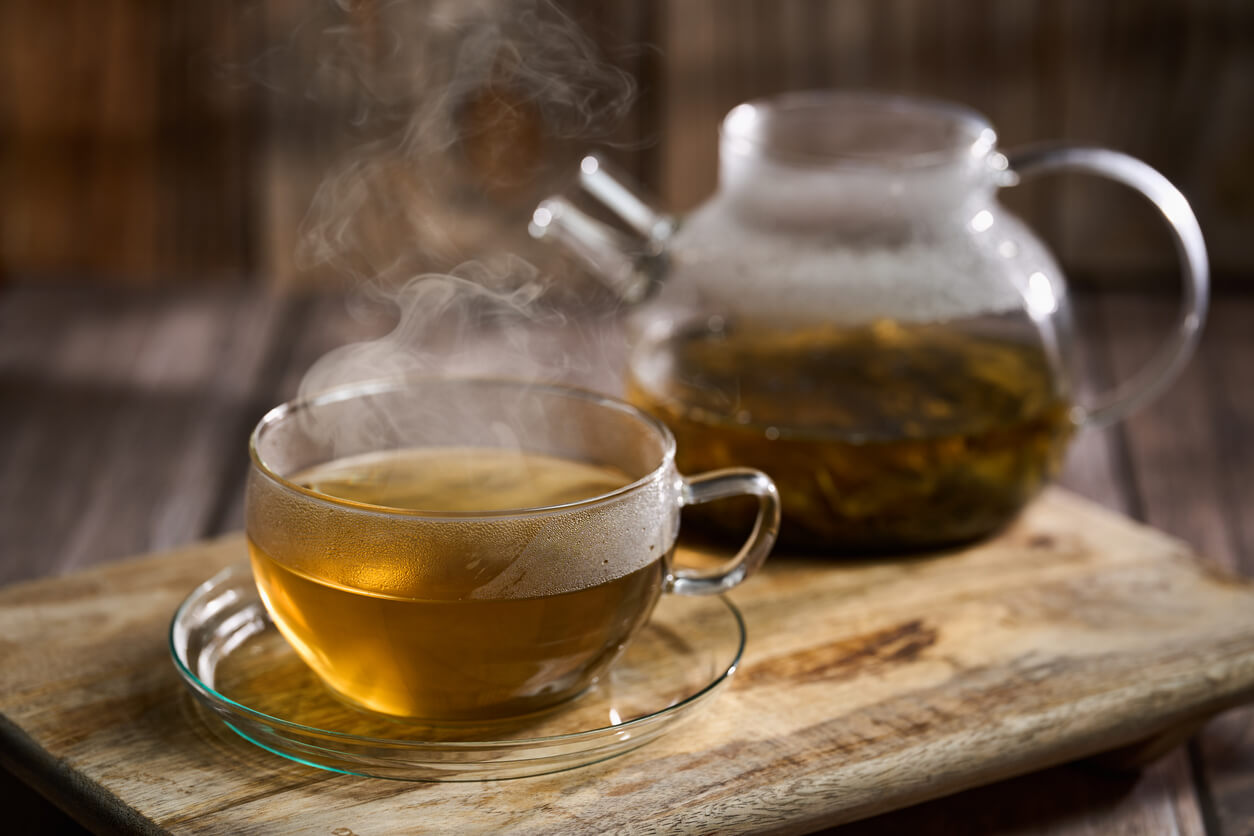
Resveratrol may help prevent and treat a variety of conditions, including metabolic diseases, neurodegenerative disorders, chronic inflammation, and even cancer.
Metabolic Health
Resveratrol may boost metabolism in people with type 2 diabetes. In several studies, resveratrol has helped diabetic patients achieve better blood pressure, lower cholesterol levels, improved blood sugar control, and increased insulin sensitivity.
Supplemental resveratrol helped reduce waist size in people with metabolic syndrome, and lowered body weight and inflammation in those with non-alcoholic fatty liver disease.
These benefits were modest in size, with one exception: short-term use of resveratrol led to meaningful improvements in HbA1c levels, a measure of blood sugar levels.
A 2011 placebo-controlled study that gave 11 obese men resveratrol for 30 days found that the supplement mimicked the health benefits of dieting without actually eating less. The men who took resveratrol experienced lower blood sugar levels, enhanced insulin sensitivity, improved mitochondrial function (a key element of metabolism), reduced liver fat, and lower blood pressure, without losing weight or altering their activity levels.
This has led some researchers to get curious about resveratrol’s potential to extend human life, given that caloric restriction is associated with increased lifespan in animal studies. (Our view on the use of animals in medical research is here.)
Brain Function

Resveratrol also has been shown to protect brain cells and improve cognitive function, which may lower the risk of developing dementia and other neurodegenerative diseases. A 2014 placebo-controlled study administered 200 milligrams of resveratrol per day to a group of healthy, overweight older people for 26 weeks. Compared with the placebo group, those who took resveratrol showed better retention 30 minutes after being asked to memorize a list of words.
Cancer Prevention and Treatment
Lab studies have shown that resveratrol has strong anti-cancer effects. It may prevent tumors from spreading by inhibiting the creation of new blood vessels and by blocking enzymes that facilitate the invasion of cancer cells into other tissues.
Additionally, resveratrol can help trigger cancer cell death (apoptosis) and stop cancer cells from dividing. Before you get too excited about this, there’s a catch. Although resveratrol shows great promise in lab tests for preventing cancer, it doesn’t seem to work as well in people. That’s because, while we can easily absorb about 75% of oral resveratrol, it’s quickly metabolized in the liver, which results in low bioavailability.
Anti-Inflammation
Clinical studies have shown that resveratrol supplements can improve symptoms and decrease inflammation in people with rheumatoid arthritis. This makes sense, given that resveratrol is a well-known antioxidant that helps neutralize free radicals and protect cells from oxidative stress. It also has anti-inflammatory properties, potentially reducing inflammation at the cellular level.
Resveratrol’s anti-inflammatory properties may also benefit postmenopausal women. A 2020 study found that women who took it for at least a year experienced less ongoing pain from age-related arthritis and reported a better quality of life. The researchers noted that these benefits were related to the compound’s ability to improve circulation.
Also related to resveratrol’s anti-inflammatory properties, a 2014 study found that supplementing with the compound helped reduce the size of foot ulcers in patients with type 2 diabetes. It did so by reducing inflammation, as shown by lower levels of a couple of inflammatory biomarkers (CRP and fibrinogen, if you’re curious).
A 2015 placebo-controlled study explored whether resveratrol could help people with ulcerative colitis, a disease that causes painful gut inflammation. Over six weeks, participants who took 500 milligrams of resveratrol daily saw a clear drop in inflammation levels and reported feeling better, while experiencing milder symptoms.
Foods Rich in Resveratrol
Red Grapes
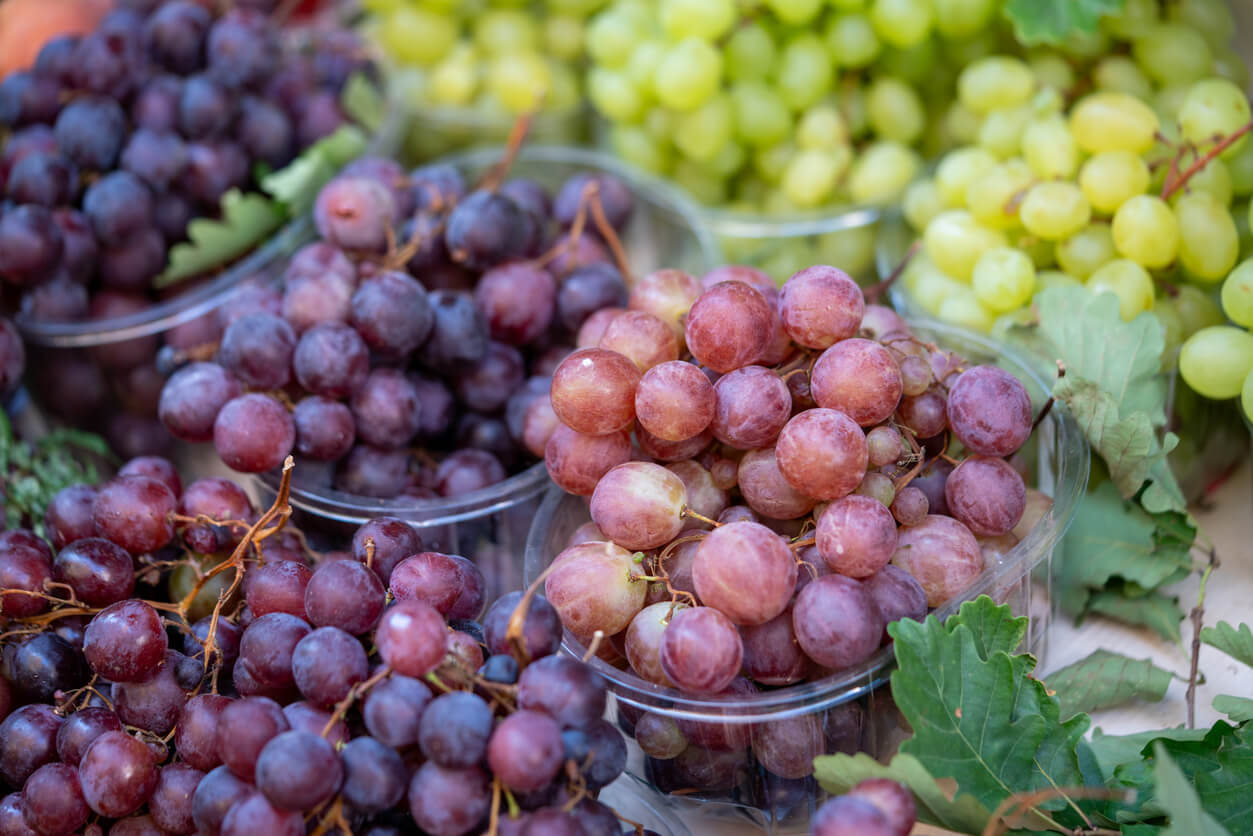
Red grapes are the most concentrated source of resveratrol before processing, but that’s a bit misleading. It turns out that the majority of resveratrol in red grapes is found in the skin and seeds, and not the sweet pulp. That’s one reason that red wine, which is made from a mash that includes those parts of the grape, can have much higher concentrations than fresh grapes.
For more on grapes, and whether they’re good for you despite their high sugar content, check out this article.
Red Wine

The amount of resveratrol in red wine usually varies from 0.2 to 5.8 milligrams per liter. That’s a huge range, and the actual level is influenced by the type of grape, where it’s grown, and how it’s made.
When it comes to red wine and health, recent research presents a more nuanced view than the original French Paradox researchers promoted. The amount of resveratrol that’s associated with significant health benefits, as we’ve already seen, requires consuming 75 liters of wine per day, which I hope you can agree is pretty unrealistic (not to mention almost certainly fatal).
Some studies suggest that even moderate alcohol consumption may not offer health benefits and could increase the risk of certain cancers. However, other research indicates that light drinking (up to two drinks a day for women and three for men) does not significantly increase all-cause mortality.
Berries

Blueberries and bilberries (no relation to the hobbit) do make resveratrol to protect their plants from predation, but at about one-tenth the levels found in red grapes. To maximize your resveratrol intake, eat the berries raw, as cooking and baking degrade the compound.
For more on blueberries and why they’re one of our favorite superfoods, here’s our full article.
Mulberries also contain resveratrol, although most of it is in their roots rather than their fruits.
Peanuts
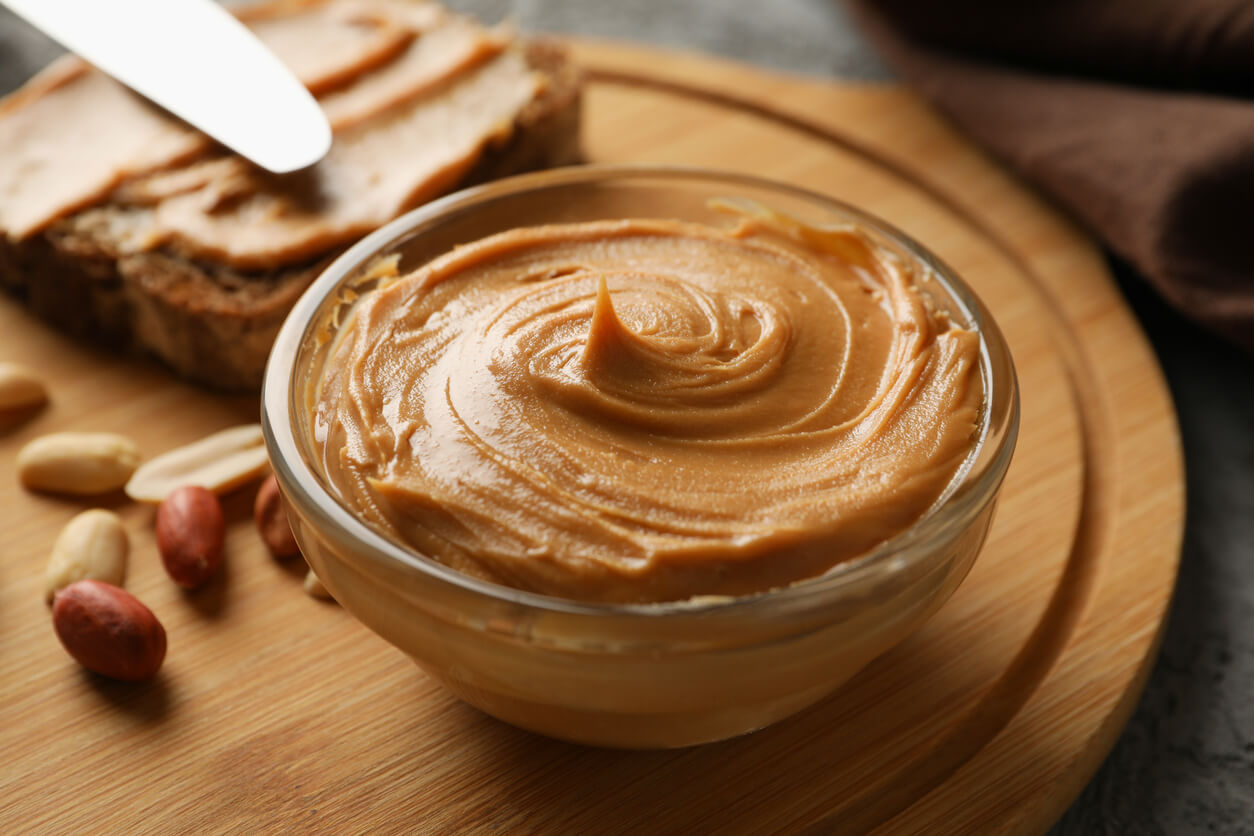
Every part of the peanut plant, from the roots to the skin and even the shell, contains resveratrol. Peanut butter has almost as much resveratrol as grape juice, and it contains about three times more than roasted peanuts with their skins on. Recent research also shows that when peanuts are put under certain kinds of stress, like changes in temperature or light, their resveratrol levels can go up even more.
For more on peanut butter and its health benefits, here’s a comprehensive article.
Chocolate and Cocoa
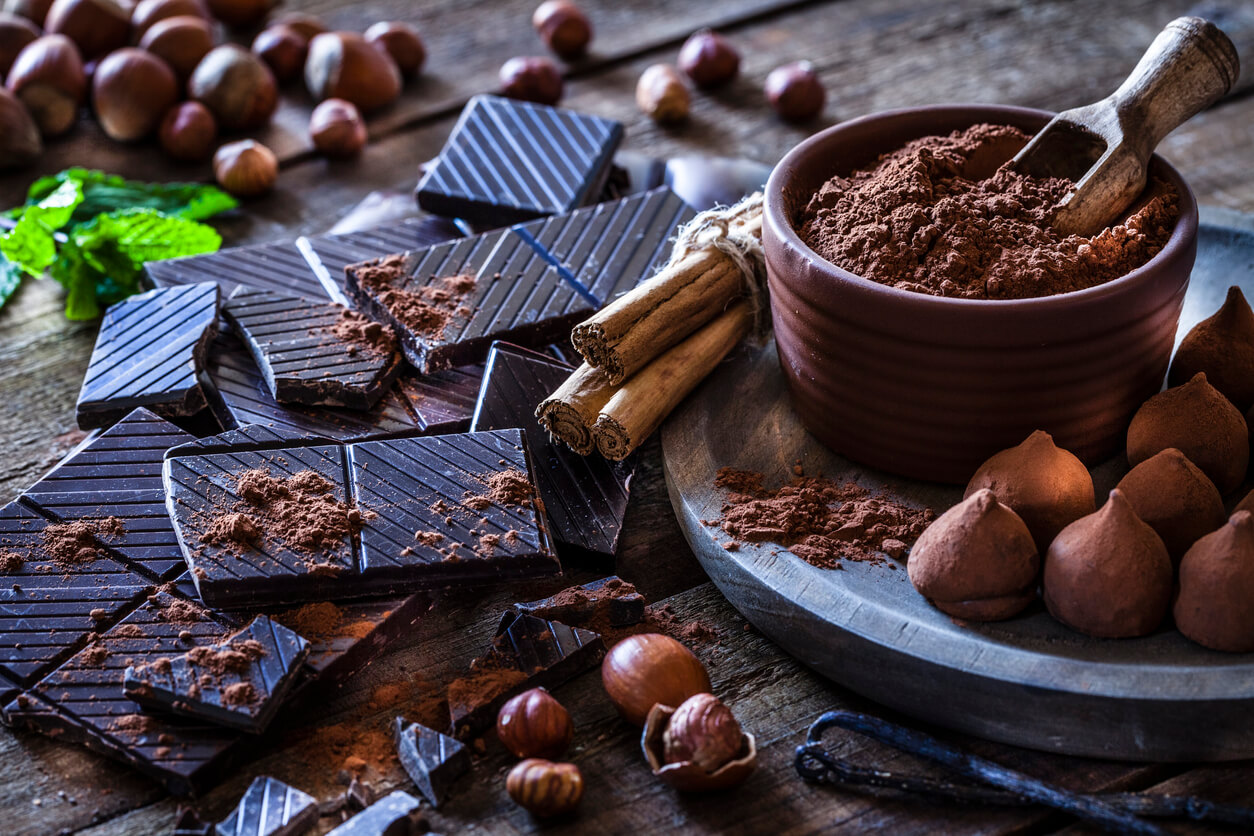
Dark chocolate and cocoa powder also contain resveratrol — about half as much as an average California red wine.
If you want to know more about chocolate, here’s a 2019 article for you. And sadly, here’s a 2023 update that strikes a more cautionary note (due to findings of heavy metals in much of the world’s chocolate supply).
Bioavailability of Resveratrol
We’ve seen that while resveratrol offers some health benefits for people, its performance in test tubes and lower organisms has been astounding. In fact, resveratrol has been shown to extend life in certain yeasts, nematode worms, and fruit flies, as well as in mice forced to eat a high-fat, high-calorie diet.
Yet so far, there has been no evidence of resveratrol’s ability to extend life in humans. Some researchers surmise that the problem is the compound’s low oral bioavailability. It’s rapidly metabolized in your intestines and liver, and enjoys only a short half-life in your bloodstream.
Some researchers, noting that resveratrol is fat-soluble, have attempted to address the issue of low bioavailability by suggesting that it be consumed with dietary fats to enhance its absorption. So far, there’s only limited and inconclusive evidence for how well this works.
Other approaches being tested to increase the amount of resveratrol absorbed from foods and supplements include improving its solubility, altering its administration, preventing its breakdown, and creating nanoformulations. While these methods have been tested in animal studies, it’s too early to determine if they will be effective in humans.
Do You Need Supplements?
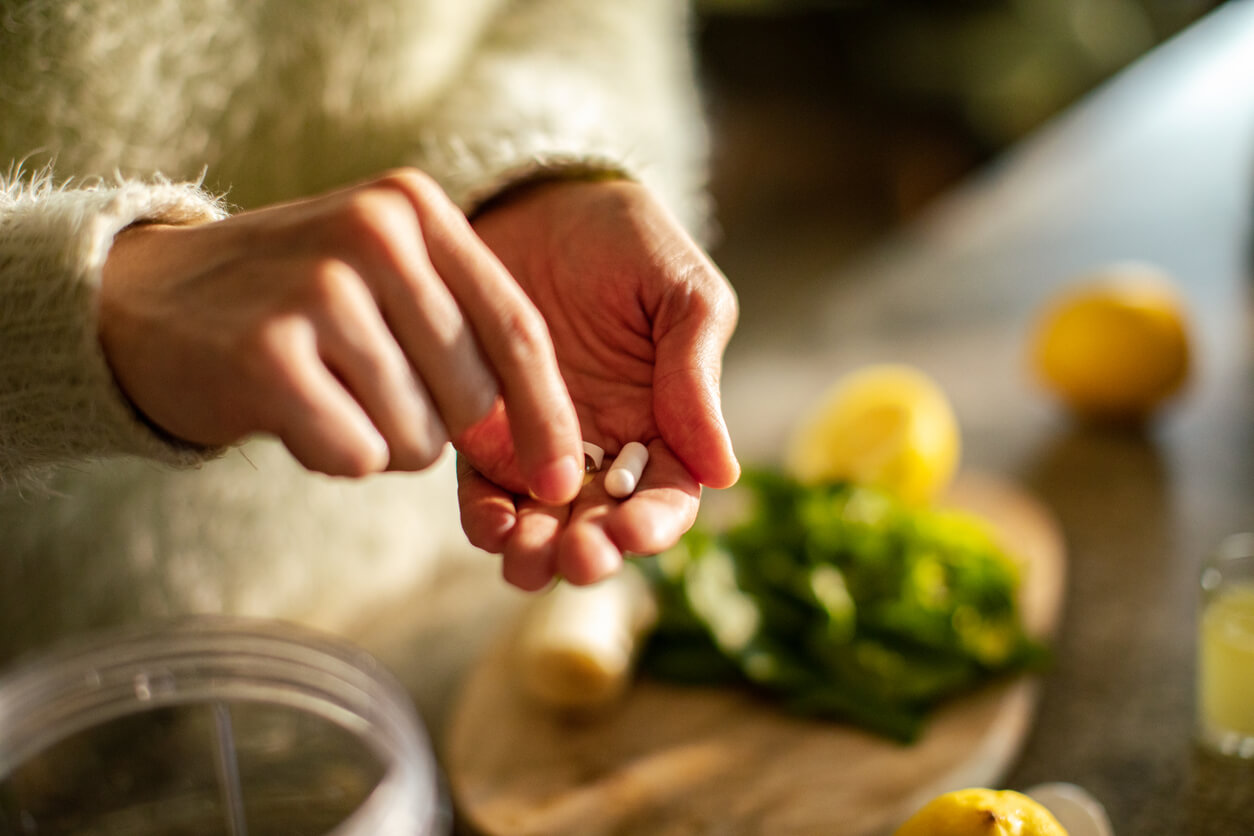
The studies on the health benefits of resveratrol that we’ve looked at all used supplemental resveratrol. That’s because even the most potent food sources provide a tiny fraction of the doses available in supplements.
For example, to get a low dose of 150 milligrams, you’d have to eat about 5,700 red grapes. Assuming you are awake for 16 hours a day, that would mean you’d consume an average of 356 grapes per hour, or 1 grape every 10 seconds. I’m not sure how you’d get anything else done.
Most people who supplement find that they can tolerate up to 1 gram per day. Higher doses (above 2.5 grams per day) may cause gastrointestinal issues like nausea, diarrhea, or abdominal discomfort.
If you choose to supplement for a specific indication, start with a low dose (100–250 milligrams per day) and increase if needed and well tolerated.
Take it with food, preferably with a healthy fat like avocado, which may improve absorption. And choose micronized or liposomal formulations, which may provide better bioavailability.
Recipes To Get Resveratrol from Your Diet
Looking for a little extra resveratrol in your daily chow? It’s hard to go wrong when some of the best sources are grapes, berries, chocolate, and peanut butter! Here are three tasty recipes that let you enjoy resveratrol through real, whole foods that love you back.
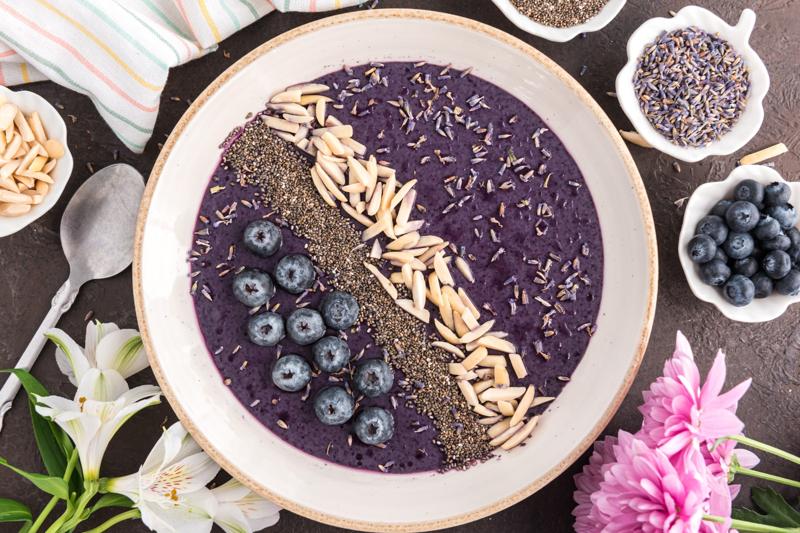
Find your calm and fuel your cells with this antioxidant-rich, floral-kissed Blueberry Lavender Smoothie Bowl. Blueberries take center stage not only for their vibrant color and sweet-tart flavor, but also for their impressive polyphenol profile, which includes resveratrol. This plant compound, also found in grapes and red wine, has been linked to cellular protection and healthy aging. A blend of spinach, hemp seeds, and almond butter offers nourishing fats, protein, and fiber to keep you satisfied. Dried lavender lends a soothing, spa-like aroma, while vanilla brings a hint of natural sweetness. Finished with a cascade of toppings, including more blueberries, crunchy almonds, chia seeds, and a sprinkle of lavender, this bowl is as beautiful as it is restorative.

Simple, vibrant, and bursting with flavor, these plant-powered Vegan Feta and Grape Skewers make snacking feel like a celebration. Crisp, organic red grapes bring juicy sweetness and a dose of resveratrol, a natural compound that supports circulation and helps the body respond to oxidative stress. Paired with tangy vegan feta and fragrant basil, each skewer delivers a satisfying contrast of textures and tastes. They’re perfect for entertaining, but just as delightful when you’re grazing solo with a glass of sparkling water and a sunny spot to sit.

Rich, chewy, and naturally energizing, these no-bake Cacao Peanut Butter Energy Squares are a plant-powered answer to ultra-processed energy bars. Cacao brings more than just a chocolatey depth. It’s a source of antioxidants, including resveratrol, which may help the body manage inflammation and support cellular repair. Peanuts also offer a natural dose of resveratrol, along with satisfying protein and healthy fats. Combined with fiber-rich dates, creamy organic peanut butter, and a hint of vanilla and coconut, each square offers a nourishing bite that fuels you with purpose. Whether you need a post-workout pick-me-up or a steady afternoon snack, these squares deliver bold flavor and functional benefits in one simple recipe.
Conclusion
Resveratrol has garnered a lot of attention thanks to the French Paradox and its purported link to longevity. While that hype has cooled, it still shows promise in lab and animal studies for fighting inflammation, oxidation, and even cancer.
And despite the mixed evidence for resveratrol supplements, the good news is that many foods rich in this compound are already celebrated for their overall health benefits. Red grapes, berries, and peanuts, in particular, can provide a spectrum of nutrients and beneficial compounds that extend beyond resveratrol. So no matter how the resveratrol research turns out, there’s every reason to continue enjoying these delicious and nutritious foods as part of a healthy diet.



